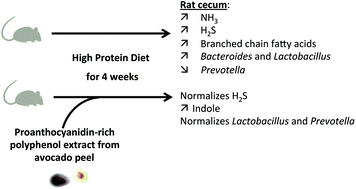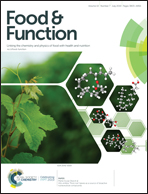Effect of a proanthocyanidin-rich polyphenol extract from avocado on the production of amino acid-derived bacterial metabolites and the microbiota composition in rats fed a high-protein diet†
Abstract
The consumption of high-protein diets (HPDs) increases the flux of undigested proteins moving to the colon. These proteins are hydrolyzed by bacterial proteases and peptidases, releasing amino acids, which in turn are metabolized by the intestinal microbiota (IM) for protein synthesis and production of various metabolites that can exert positive or deleterious effects, depending on their concentrations, at the colonic or systemic level. On the other hand, proanthocyanidins are polymers of flavan-3-ols which cannot be absorbed at the intestinal level, accumulating in the colon where they are fermented by the IM producing metabolites that appear beneficial for colonocytes and also at the peripheral level. This study evaluated the effect of an avocado peel polyphenol extract (AvPPE) rich in proanthocyanidins on the production of cecal bacterial metabolites and microbiota composition in rats fed a HPD. Compared with the normal-protein (NP) group, HPD did not markedly affect the body weight gain of the animals, but increased the kidney weight. Additionally, the HPD induced a higher cecal concentration of ammonia (NH4+/NH3), hydrogen sulfide (H2S) and branched-chain fatty acids (BCFAs). The supplementation with AvPPE attenuated the production of H2S and increased the production of indole. On the other hand, the HPD affected the composition of the cecal microbiota, increasing the relative abundance of the genera Bacteroides and Lactobacillus, while decreasing Prevotella. The AvPPE counteracted the increase induced by the HPD on the genus Lactobacillus, and increased the relative abundance of [Prevotella]. Our results contribute towards explaining the health-promoting effects of proanthocyanidin-rich dietary foodstuffs including fruits and vegetables.



 Please wait while we load your content...
Please wait while we load your content...